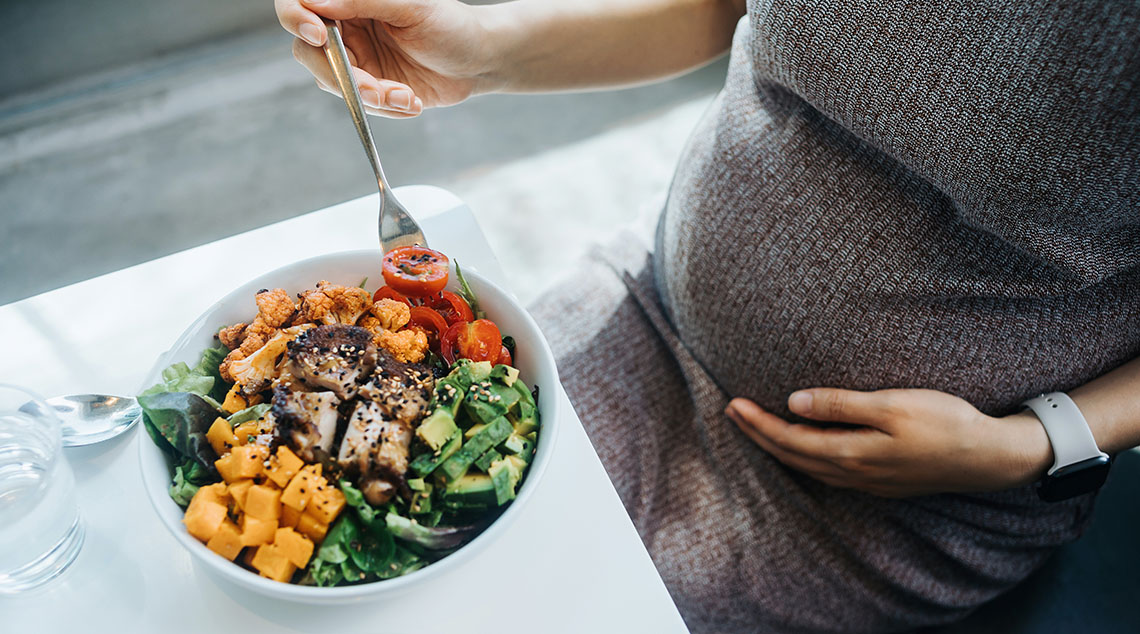How much food do you really need during pregnancy?
New research reveals the energy cost of pregnancy is much higher than experts previously thought. Does this mean you should eat more?
Growing a whole other human is, understandably, a big deal for the body, and a new study has revealed that the energy cost of reproduction is far greater than what was previously believed.
A team of biologists at Monash University looked into the energy that’s used to reproduce and carry a baby, rather than just the energy that’s taken up by the baby.
“For mammals, the energy it takes to synthesise and carry offspring makes up about 90 per cent of the total energy expended on reproduction, so only about 10 per cent of the energy can be measured in their offspring themselves,” says lead researcher Dr Sam Ginther.
While the “eating for two” myth has been debunked, these new findings suggest that women may need to eat more during pregnancy.
How much energy is used during pregnancy?
It’s understood that pregnant women use more energy and therefore need more food. But in light of new research, Dr Ginther says energy usage may have been underestimated.
“Most biological theory that describes the allocation of energy towards reproduction considers the offspring exclusively,” he says.
Dr Ginther’s research offers a big-picture perspective of how much energy the body uses during pregnancy.
By looking at indirect energy costs (such as the energy it takes to grow and carry a baby), the study found that pregnancy uses up more energy than experts previously understood.
The study looked at the metabolic load of pregnancy for humans and a range of animals, and is a starting point for future research.
“We think our study reshapes our fundamental understanding of how animals allocate energy to growth and reproduction,” Dr Ginther says.
Should you be ‘eating for two’ during pregnancy?
No one’s denying a woman her pregnancy cravings, but obstetrician and gynaecologist from Melbourne Mothers, Associate Professor Vinay Rane, says women don’t need to go as far as doubling their intake.
“While pregnancy is a time of increased nutritional needs, it does not warrant doubling one’s food intake,” he says.
Instead, Assoc Prof Rane says pregnancy is an opportunity to create healthy habits that support a mother and child’s wellbeing.
“The concept of ‘eating for two’ can be viewed favourably when seen from a slightly different perspective,” he says.
“Pregnancy offers individuals the opportunity to optimise their own health, whether it be lifestyle modifications like quitting smoking or reducing alcohol consumption, or addressing their sleep habits.”
Do you need additional calories during pregnancy?
Assoc Prof Rane recommends a balanced diet and gradual food intake that favours certain nutrients.
“(Pregnancy) calls for a balanced, nutrient-rich diet and a modest increase in caloric intake as the pregnancy progresses,” he says.
“We encourage mothers to optimise their intake of various nutrients like iron, vitamin C, and folate even before pregnancy begins.”
In the first trimester, Assoc Prof Rane says women are generally OK to stick with their existing diet.
“As the pregnancy progresses, however, a modest increase in caloric intake of around 400 extra calories per day would be reasonable,” he says.
According to fertility and reproductive health dietitian Bianca Woger, this increase can vary between trimesters as different stages of fetal growth occur.
“An additional 1400kJ (335 calories) per day are recommended to support the growing fetus in the second trimester, and this increases up to 1900kJ (454 calories) extra in the third trimester,” she says.
But the quality of food is just as important as the quantity. The Australian Dietary Guidelines recommend 2.5 extra servings of carbohydrates and one extra serving of protein compared to non-pregnant women.
“This can give us a better idea of what areas to focus on when increasing overall dietary intake,” Bianca says.
For nutrient-dense snacks, Bianca suggests nuts, fruit and Greek yoghurt, or vegies and homemade hummus.
Why do you need extra calories during pregnancy?
Extra food gives a mother the energy to create maternal reserves in preparation for breastfeeding, says Assoc Prof Rane.
“The pregnant mother also uses the extra nutrition to make extra blood, produce amniotic fluid and grow a placenta as well as meet the needs of one or sometimes more babies.”
Healthy food for pregnancy
Besides keeping a woman full and fuelled, the right nutrition can foster a pleasant pregnancy.
“Having adequate nutrition in pregnancy can improve energy levels, support regular bowel movements and combat pregnancy side effects such as reflux, nausea, and vomiting,” Bianca says.
“Managing side effects in pregnancy, with a focus on nutrient repletion can make pregnancy a bit more enjoyable.”
Bianca recommends a diet that’s varied and includes these non-negotiable nutrients.
Folate/Folic Acid
Folate is crucial for preventing neural tube defects in babies. It’s found in foods like leafy green vegetables, citrus fruits and fortified cereals.
Iron
Iron supports the increase in blood volume during pregnancy and sets the baby up for the first six months of life. Key sources include red meat, poultry, fish, lentils, wholegrains and spinach.
Omega-3 fatty acids
Omega-3 fatty acids are important for a baby’s brain development. Sources include fish, flaxseeds, and walnuts.
More on pregnancy:
- Why paracetamol in pregnancy is cause for caution, not alarm
- Unmasking melasma: a common pregnancy skin condition
- Bleeding in pregnancy: It may not be a miscarriage
- Should you drink coffee during pregnancy?
Written by Hayley Hinze.





